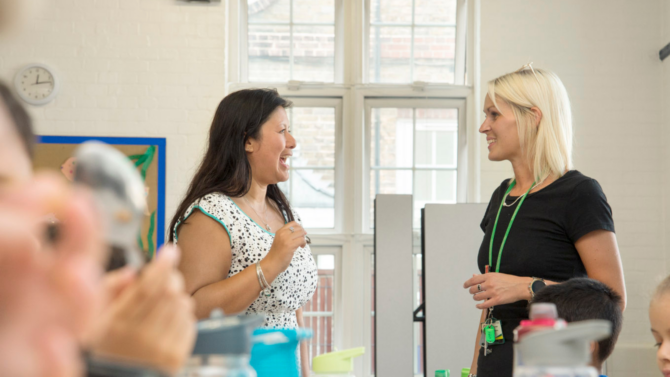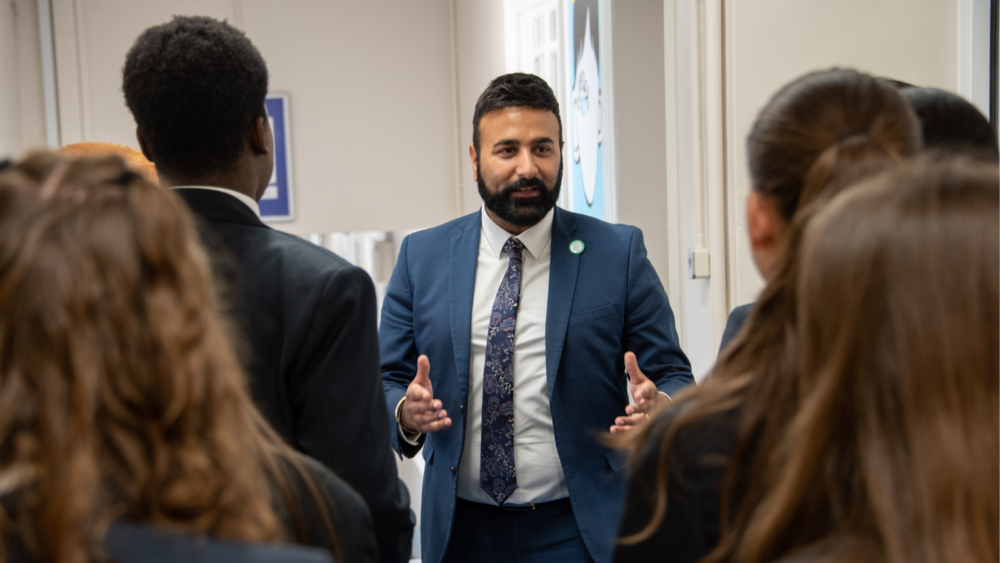As a school leader, how often do you put yourself first? Prioritising your professional development is key to helping you manage stress, avoid burnout and effectively supporting those around you to achieve great things in your school.
Making time to process your thoughts and feelings can help you to be a more self-aware and emotionally intelligent leader. If you’re wondering whether it’s possible to be both a strong leader, and talk about your feelings, here are some things to consider:
- Being open sets a great example to everyone around you. This might encourage them to talk through their own experiences, and create a more supportive environment where talking over challenges is completely normal.
- Ignoring or bottling up your own challenges is exhausting. It may also lead to other kinds of coping behaviours, like comfort eating, drinking too much or being irritable at home or work. Facing our challenges may help us to carry things more lightly, and lead to improved resilience in our daily lives.
- Vulnerability is strength. It can be difficult for school leaders to be vulnerable in front of their peers. It’s important to recognise that showing vulnerability isn’t unprofessional; in fact it is a sign of courage and has been shown to be key in effective leadership.
- Emotions aren’t necessarily ‘good’ or ‘bad’. They carry messages that help us understand our lives and experiences. By spending time examining them, we might find new perspectives or ways of approaching challenging situations.
- When we open up it can release feel good brain chemicals like oxytocin and serotonin. Put simply, talking (and being listened to) can make you feel better, but it can also help us feel more connected to people, and help improve relationships.
We know as school leaders you experience particular pressures throughout the year from Ofsted inspections through to implementing changes in policy. This was your reality long before Covid. The 2021 Teacher Wellbeing Index clearly shows that levels of stress are felt more keenly by senior leaders.
How can Education Support help?
We offer fully funded professional development for school leaders in England and Wales:
Our peer groups give you the space to process high-pressure situations with other school leaders in safe, and confidential environment. You’ll make new connections and gain new insights and perspectives.
We will help you be the most effective leader possible, sharing new strategies and ideas that will benefit your whole school community.
Our one to one telephone support also gives you a safe and confidential space to talk about what you’re facing in both life and work.
You will develop new coping strategies and feel more in control in your daily life.
Please visit our School Leaders webpage to find out more and apply.
As a leader my time is precious – is it worth it?!
The simple answer is – yes! Our School Leaders service is an investment in you that will benefit your whole school. You may notice the following benefits by taking part in our service:
- Time out to take stock of your role can be reinvigorating, giving you a new perspective on existing challenges.
- Increased resilience and energy from dedicating some time each week to focusing on yourself and your own development as a school leader.
- Feeling listened to and supported in a safe, confidential, and non-judgmental forum gives you the freedom to fully express yourself, and explore any challenges you might be facing.
- Knowing that other leaders are experiencing the same concerns and feelings can be comforting, and may help you feel less alone.
- You don’t have to talk about ‘work’ problems, it’s a safe space to explore all aspects of life, and not feel guilty about it. Many of those who take part report that it gives them the ‘headspace’ to think about things beyond their leadership roles.

What other leaders are saying about our professional development:
Kirstey, a headteacher of seven years recently took part in our Peer Support sessions. She liked the practical element of the sessions and used the exercises she learnt with her senior leadership team. She also found it useful to learn from other leaders:
“It was so useful to see how other people were tackling things and to learn new strategies for dealing with the challenges we were facing; it was so reassuring to realise that we were all in the same boat.
“As a headteacher, the buck stops with you. You need to think about everyone in your school’s wellbeing and that often comes first. But we need to look after ourselves too, or we’re no good to anyone.”
Headteacher Austin sometimes finds the role of a leader is a lonely one. He found the safety of sharing with other leaders reassuring:
“You’re not sharing with anyone who could interpret what you’re saying as ‘not coping.’ This neutral ground and neutral format is very helpful. There are no judgements, it’s not going anywhere.
“If you don’t think you’ve got a couple of hours to take out once a fortnight to benefit yourself, then you need to do it. We’re all busy. This job never ends. You’re never finished completely.
“You’ll be better at prioritising, at devolving your leadership, better at communicating what you want and need from others if you take the time to do this, rather than if you just plough on and keep trying to carry on.”
Headteacher Ella echoed their experiences:
“I was able to focus on my own wellbeing using the strategies I’d learned, which helped me to manage my mental health at home and work. It had a positive effect on all areas of my life.”
How do I apply?
To apply for our School Leaders service, please visit our School Leaders webpage and click ‘apply’ on either the England or Wales service to complete a quick and easy online form.
Education Support is the only UK charity dedicated to supporting the mental health and wellbeing of teachers and education staff. We believe that better mental health leads to better education.

















Your thoughts